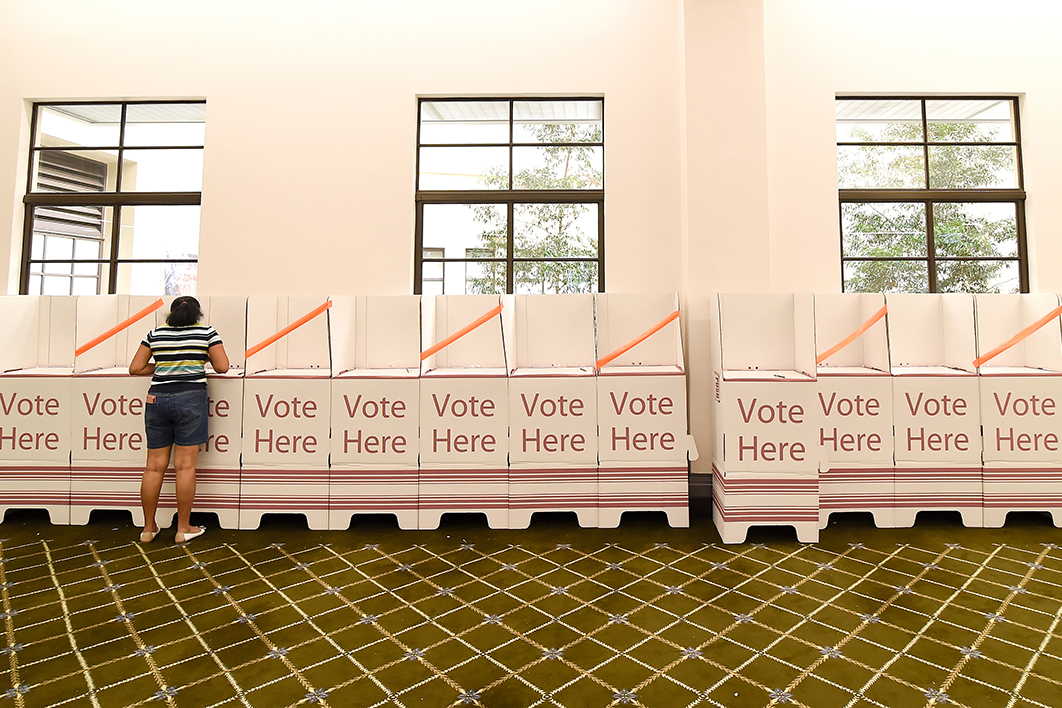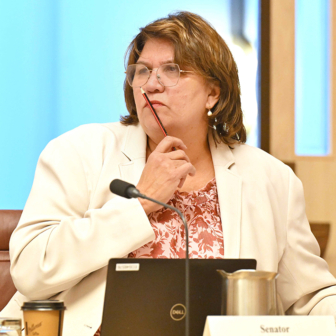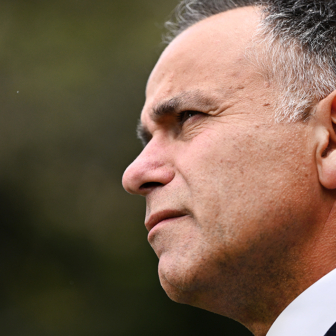Last Saturday, amid lockdowns and healthcare planning, Queensland held its four-yearly local government elections. Ten days earlier, state parliament had adjourned, leaving the government to decide whether or when it will sit during the next six months. On the same day, the state’s chief medical officer had been given the power to impose strict limits on human activity, and at roughly the same time the governor-general had made a Human Biosecurity Emergency Declaration, conferring similar powers on the federal health minister. At the time of writing, no one is allowed to meet in public with more than one unrelated person.
Among such high drama, what room is there for the ordinary functioning of electoral democracy? Elections, after all, serve two great roles. They are the seasonal regenerators of legitimacy in representative government, and they are great rituals, the only truly public gathering in a secular society. An unexpected contagion and partial lockdown undermines both roles. Must elections be held? And, if so, when and how?
As to the “must” and “when,” some elections are less constrained than others, and local elections least of all. New South Wales was due to hold its local government elections in five months’ time, in September; like Britain, but unlike Queensland, it has postponed them for a year. Existing councillors and mayors will serve an elongated five-year term, with their successors serving a truncated three-year term.
Queensland, however, ploughed on. Two major councils needed to come out of administration, and the medical advice was that queuing to poll was safer than buying groceries. There are few more orderly places than an Australian polling booth under the secret ballot.
Parliamentary elections, by contrast, are protected by often-rigid constitutional constraints. The federal House of Representatives can only continue for three years from its first sitting. Fortunately, the three-year rule carries Australia through to 1 July 2022. (By-elections are another matter.) None of this, however, guarantees the usual mechanisms of parliamentary scrutiny and debate. Federal parliament has adjourned without a future sitting calendar, though with the potential to meet electronically. Standing orders were hurriedly amended to allow “the manner in which Members may be present… to be determined by the Speaker.” It may be reconvened, ad hoc, as it is for 8 April to pass urgent wage subsidies.
The parliamentary building itself is now indefinitely barred to visitors, and the traditional May budget has been deferred until October. The various executive councils may also now meet electronically. Also meeting virtually is the newly created “national cabinet” of all nine national, state and territory heads of government: a kind of Council of Australian Governments on speed. The machinery of government, then, is proceeding apace, but it is far from politics as usual.
Queensland is one of three jurisdictions due to hold four-yearly general elections later this year: the Northern Territory on 22 August, the Australian Capital Territory on 17 October and Queensland on 31 October. Each date is fixed in law, but in the territories the dates are weakly fixed. The ACT legislature can undo its own election date and federal parliament can rejig the Northern Territory’s cycle to provide flexibility as needed.
Queensland is alone in being locked into an election later this year. Its constitution allows the “last Saturday in October” date to be postponed in “exceptional circumstances” such as “a natural disaster,” provided the leader of the opposition agrees. But this is a one-off option and limited to a five-week delay. Such a hiatus could extend the outgoing parliament to buy time to amend the electoral act to facilitate new processes. (One would hope, however, that such planning would be done well ahead of schedule.)
A longer postponement or cancellation would require a referendum, and it is too cute to imagine holding one statewide vote simply to avoid another. The other extreme scenario would be an extra-constitutional assertion of reserve powers to avoid a dissolution or issuing of electoral writs. If challenged in court, though, such a manoeuvre would hold no water.
What of the “how” of elections in these times? Writing about the US midterm elections held during the 1918 Spanish flu pandemic, Jason Marisam noted that three issues are as important today as then: neutral election administration; election officials’ emergency powers; and disenfranchisement of voters unable to attend the polls.
Unlike in the United States, Australian electoral commissions have legal as well as substantive independence. Coupled with a tradition of career professionalism, this gives us a reassuring foundation. Some of the smaller commissions chafe against size and resource constraints, however, making the sharing of expertise and advice among these agencies crucial. And whatever their funding, all commissions rely on an army of far-flung casual staff to conduct polling and the count at thousands of locations. This creates challenges for consistent application of what we might call “workplace health and safety.”
Ultimately it is up to parliaments to decide which voting avenues will be available. Australia already has a high degree of “convenience” voting via early and postal balloting. (These channels accounted for upwards of 70 per cent of the total turnout at Queensland’s local elections.) Legislating so that electors need give no reason for voting early or by post would be one way of diluting polling day turnout during a pandemic. But predicting and managing early voting would be no less a safety issue than polling day itself.
An alternative would be an all-postal ballot, similar to the marriage-equality survey. All-mail balloting means a delayed count. It also raises significant security issues. If almost every household receives ballots, the risk of theft is magnified. As former election official Michael Maley notes, there are also logistical challenges: ensuring the safety of the additional staff required and handling the flood of extra paper. (Each postal vote involves a physical delivery to the elector, then a physical delivery to the commission of a doubly enveloped ballot.) In a small blessing, the Queensland and territory parliaments are unicameral, with no unwieldy upper house ballot papers to add weight to the problem.
What of remote voting options? For its local elections, Queensland extended voting by telephone to those under isolation, as well as the infirm. Australia’s most advanced e-voting platform is New South Wales’s iVote system, which offers internet or telephone voting facilities to electors who are disabled, remote or outside the jurisdiction. It has never had to handle more than 300,000 votes at an election and experienced teething problems with call centres and downtime at the 2019 poll. Scaling it up, let alone adapting it to another state’s polling requirements, could prove heroic in current circumstances. Nor is it possible to completely secure internet voting any more than any other voting option. Such an experiment in a time of uncertainty could stretch public trust. Voting from home, whether by the internet or post, also endangers the secrecy of the ballot for those in subordinate relationships.
Giving electoral officials emergency powers will involve greater administrative discretion and powers of direction. Yet elections, as with much else in government during a pandemic, will require agency rulings. In ordinary times, commissions would run a mile from such powers, to preserve their perceived independence. They tend to see themselves as administrators rather than regulators: as umpires implementing detailed rules laid down by parliaments, not as designers of the game. To make rules is to invite criticism, especially when the rules have (unintended) partisan effects or (inevitable) impacts on liberties.
An example of such a directive at the Queensland local elections was the strict limits on how-to-vote cards and campaign paraphernalia at polling places. That direction was made by the Electoral Commission Queensland, or ECQ, under direct statutory delegation. Although they are a staple of preferential voting, many people saw how-to-vote cards as wasteful even prior to any concerns about viral transmission. Few eyebrows were raised at what in any other time would have been a draconian directive raising wider questions about electoral freedoms.
A second example was an ECQ direction that limited scrutineering, to the chagrin of some candidates. This direction was made under powers urgently given to the ECQ via ministerial regulations. It may even have contained a typo that suggested it took effect the day after election day.
Neither of these examples is anywhere near as breathtaking as the executive’s power, through overnight fiat, to stringently restrict people’s movement. (A good example is this Home Confinement Direction.) By contrast, in making its directions the ECQ acted in sync with a detailed local government election public health direction made by the state’s chief medical officer. So while there are real concerns about executive accountability in times of “emergency,” there is no lack of a rule of law in the form of chains of delegation and rulings through which expert agencies are working together. We may yet come to see parliamentary drafters as among the unsung public sector workers of these times.
What of disenfranchisement? In a sense, calling off a poll would be the ultimate disenfranchisement. But holding one in an ongoing pandemic will affect turnout. It may be practically or psychologically harder for certain groups — the elderly, the afflicted, those in quarantine and those stuck overseas — to poll. Cynics might say that elections are already skewed by higher turnout among older citizens. But that would not mollify individuals who miss out. How would an all-postal vote pan out, for instance? Will everyone feel safe venturing out to find their nearest red postal portal? Are younger people, stuck at home and relying on online shopping, growing more familiar with the postal service?
The flip side of disenfranchisement is forced enfranchisement. How does compulsory voting stand up in these times? At the Queensland local elections, the ECQ had no choice but to quietly stress the mandate to vote. Turnout approached 75 per cent, a remarkable figure in all the circumstances and proof of how legal compulsion habituates us. Presumably the other quarter of the electorate will receive show cause notices. Will everyone who replies by citing “virus concerns” see the fine waived? The deputy premier is signalling that this should be the case.
There will doubtless also be a few electors who say, “I didn’t realise there was an election on.” Normally such ignorance is unreasonable. But local politics can be easily lost in a barrage of national and international events. Last year the NSW Supreme Court accepted ignorance of a low-profile, out-of-season local election as an excuse for not voting, under the defence of “honest and reasonable mistake of fact.”
Australia is not alone in facing these weighty questions. The United States is already intensely debating them, given it is in the middle of its primary season and has congressional and presidential elections set for November. When Queensland went to its local polls, some wistfully asked if these would be the last democratic elections held anywhere in the foreseeable future. The answer is clearly “no.” Elections to the Irish Seanad proceeded last week. These are low-key at the best of times, being indirect, postal elections for forty-nine members of sectoral “panels” rather than a vote of a mass electorate.
One lesson from Ireland was how the counts, from Dublin Castle and the two university constituencies, were streamed live over several days. (The voting system, akin to the Australian Senate’s, is fiendishly complex.) If you were suffering insomnia as a result of current events, these streams would have had a usefully soporific effect. But their real public benefit lay elsewhere: accompanied by explanations from the returning officer, the streams provided a visual token of openness. Given limits on physical scrutineering, this may be important as a salve for conspiracy theories and a way of keeping candidates and activists informed.
National elections in Mali also proceeded last week. Polling went ahead with in-person voting, overshadowed as much by the kidnapping of the opposition leader as by the early stages of the virus outbreak. Francophonic Mali operates on a two-round system, akin to our preferential ballot but spread over two election days, weeks apart. So the decisive second round of voting on 19 April may occur during an escalation of the virus. Yet, despite the health risks involved, after being long delayed by civil unrest the elections were seen as essential for any hope of political advancement.
This account of challenges to electoral democracy is at best a preliminary one. It is rooted in the contours of the present epidemic in Australia, assuming controllable paths of contagion and continuing social order. It leaves out broader political considerations. Chief among these is whether incumbents have undue advantage in times of upheaval. Not a single ward changed hands in the Brisbane City Council. Will electors become more risk-averse as politics as normal and opposition critiques become muted?.
In his novel The Plague, Camus wrote that “each of us had to be content to live only for the day, alone under the vast indifference of the sky.” This is the existential dilemma we are facing as individuals. Collectively, though, we live under a vast and far from indifferent system of government that is trying to plan for an uncertain future. •




